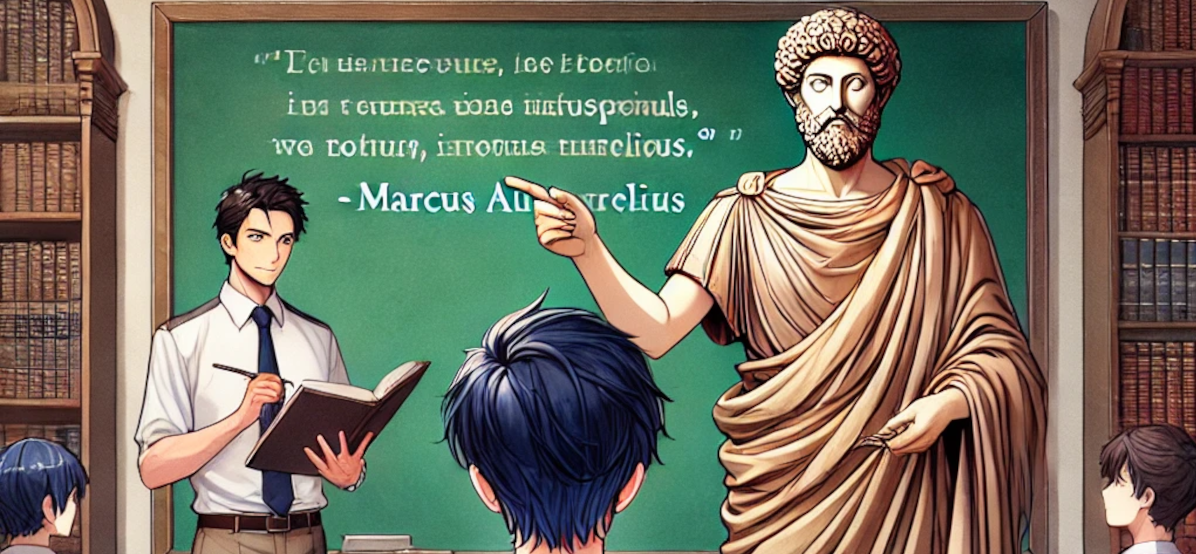We are constantly bombarded with news, updates, and alerts that compete for our attention. Modern life is akin to standing in the center of a bustling city square, while a cacophony of voices clamors for your notice. Neon signs flash incessantly, each one a beacon of advertisements vying for your gaze with promises of irresistible deals and must-have products. Digital screens on every corner project a whirlwind of news stories, their urgency conveyed through bold headlines and relentless, never ending, scrolling tickers. Notifications ping and buzz like persistent gnats, each one a tug on your consciousness, dragging your focus from one shiny object to the next.
In such a world, there are two phrases you might need to remain sane. “I don’t know” and “I don’t care. In this article we’ll discuss each in turn, why they’re important, and how to apply them as a Stoic would.
Embracing “I Don’t Know”
Modern life demands omniscience. Somehow, we are expected to know every detail, fact, trend and New Hotness that presents itself. However, the Stoic philosophy encourages us to reject that false expectation. You can’t know everything, you shouldn’t want to know everything, and even if you had all the time in the world you don’t actually have access to most of the information in the world. So, instead of holding yourself to an expectation you’ll never meet, do the opposite – only focus on the things that actually matter in your life.
What’s your spouse’s boss’s name? Your best friend – how’s he doing on that big project he was talking to you about? What’s got your mom worried right now? These are the things you should know, should spend time finding out, should remember, and should care about. These are the things that actually, directly, impact you and what’s more, these are the things that, if you invest in, they will invest back into you.
I’d ask you to imagine the constant stress of trying to stay updated on every political, economic, or social issue but I suspect I don’t need to ask you to imagine it – you’ve tried it! And you failed, and you were worse off for the effort because most of what you had access to was biased half-truths made by one of (and this should terrify you) only six international companies whose job is to cultivate a docile, distracted, populace to govern. By embracing “I don’t know,” we can pull our focus back to where it serves us. Our personal growth, relationships, and our immediate environment. That’s what matters. That’s what you can control. That’s where you mind should be, and that is what you need to know.
The Liberation of “I Don’t Care”
While “I don’t know” reflects acceptance of our cognitive limits, “I don’t care” signifies a deliberate choice to disengage from trivial matters. This phrase embodies the Stoic practice of distinguishing between what is within our control and what is not. By declaring “I don’t care,” we communicate that, in our own mind and lives, we come first, and all our efforts stem from a focus on our well-being and values. This approach allows us to conserve our energy for pursuits that align with our principles and contribute to our personal growth. It means prioritizing meaningful activities and relationships over the noise of the outside world. To steal a line from a book I read once, to be in the world not of the world.
By caring in a selective manner, we maintain our mental clarity and emotional balance, ensuring that our actions are purposeful and impactful. In doing so, we uphold the Stoic ideal of living a life directed by reason and virtue, rather than being swayed by external distractions and superficial concerns.
Consider the energy wasted on social media debates, celebrity gossip, or sensational news stories. By adopting “I don’t care,” we free ourselves from these distractions and reclaim our focus. This doesn’t mean becoming indifferent or apathetic but rather discerning and purposeful in where we invest our concern. When we care about something, let us truly care. And when we choose, with intention, to not care about something then let us truly and sincerely not care about it.
Disconnecting for Mental Clarity
I believe the pervasive influence of technology and media is a form of psychological warfare, distracting us from meaningful pursuits and keeping us in a constant state of anxiety. Stoicism advocates for regular disconnection from these sources to preserve our mental clarity and well-being. This detachment is not about ignorance but about intentional living—choosing where to direct our attention and energy.
Schedule regular digital detoxes. Limit social media usage. Instead of reading 100 clickbait titles, read one really good article written by someone you choose to care about. Use the time and mental space gained to engage in activities that enrich your life—reading, meditating, spending time with loved ones, or pursuing hobbies. This conscious disconnection helps reinforce the Stoic principles of focusing on what is essential and within our control and gives you the freedom and head space to focus on getting to know the people and things you care about.
Conclusion
The phrases “I don’t know” and “I don’t care” serve as powerful reminders of the Stoic ideals of humility, discernment, and purposeful living. In a world intent on distracting us to death, embracing these expressions allows us to reclaim our focus and direct our energies towards what truly matters. By acknowledging the limits of our knowledge and choosing where to invest our care, we cultivate inner peace and live more meaningful, intentional lives. Disconnecting from the incessant flow of trivial information is not only good and right but essential for our mental and emotional well-being.

